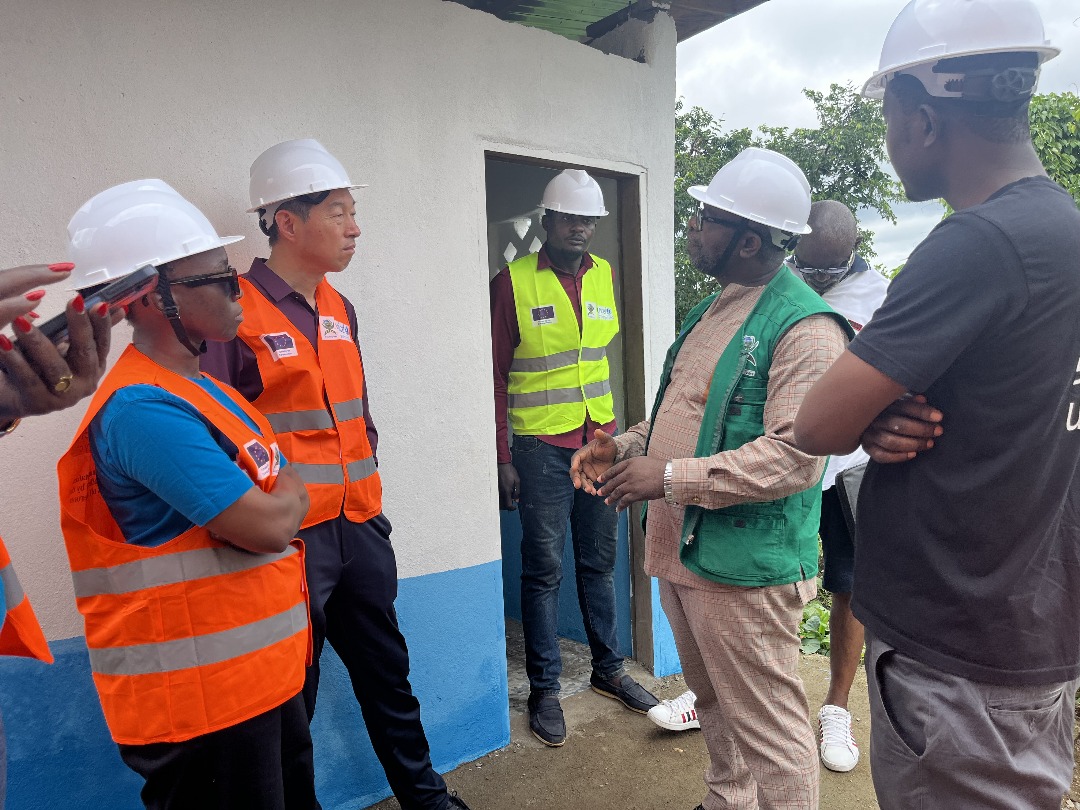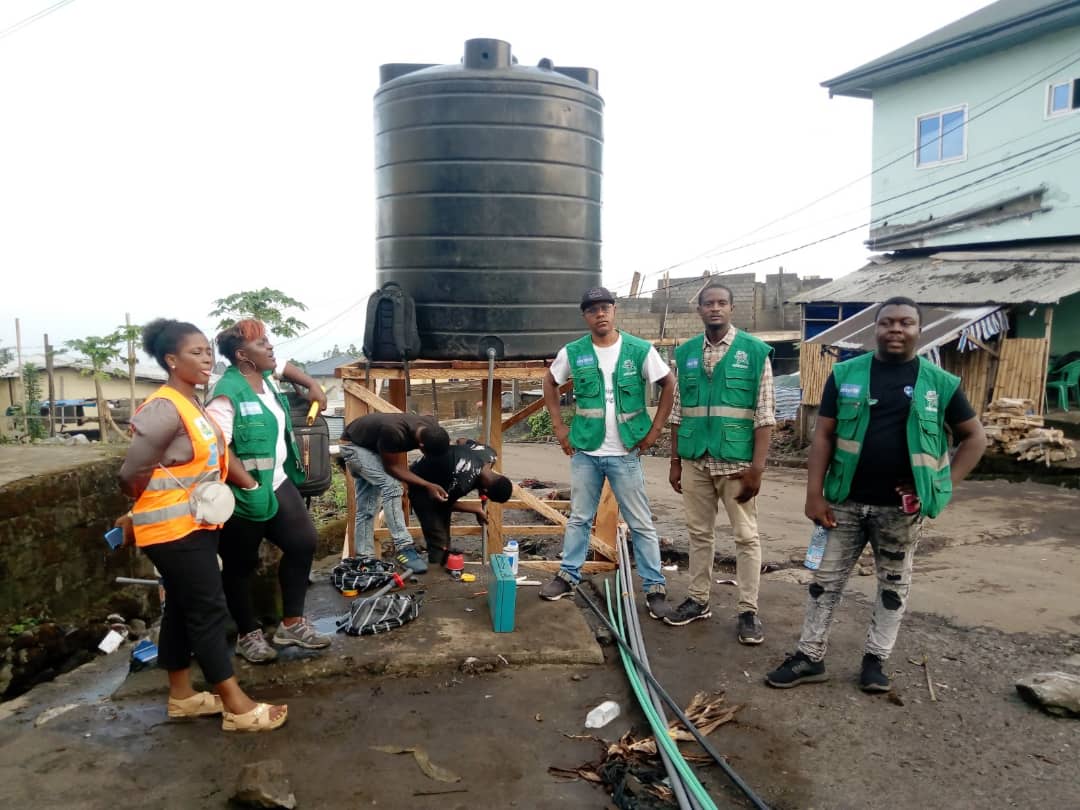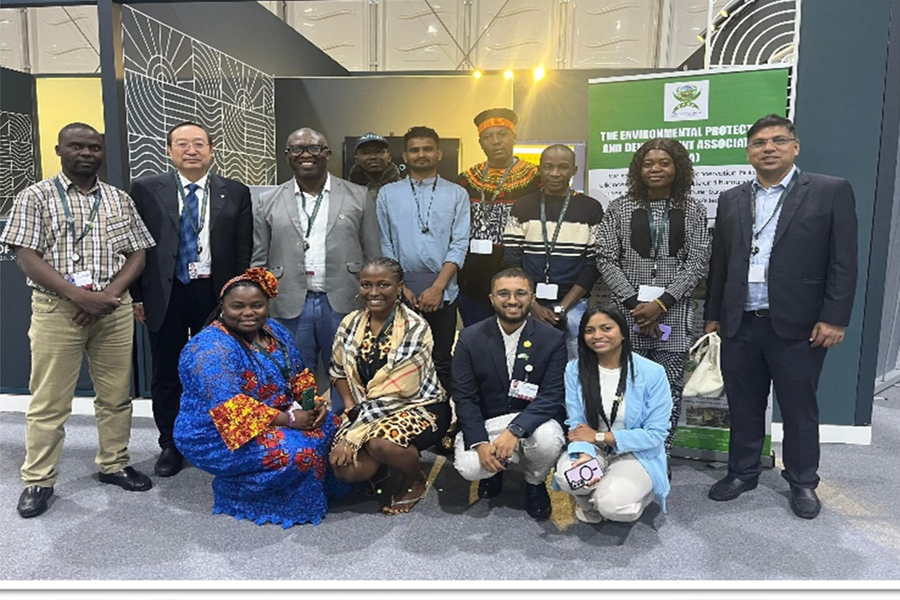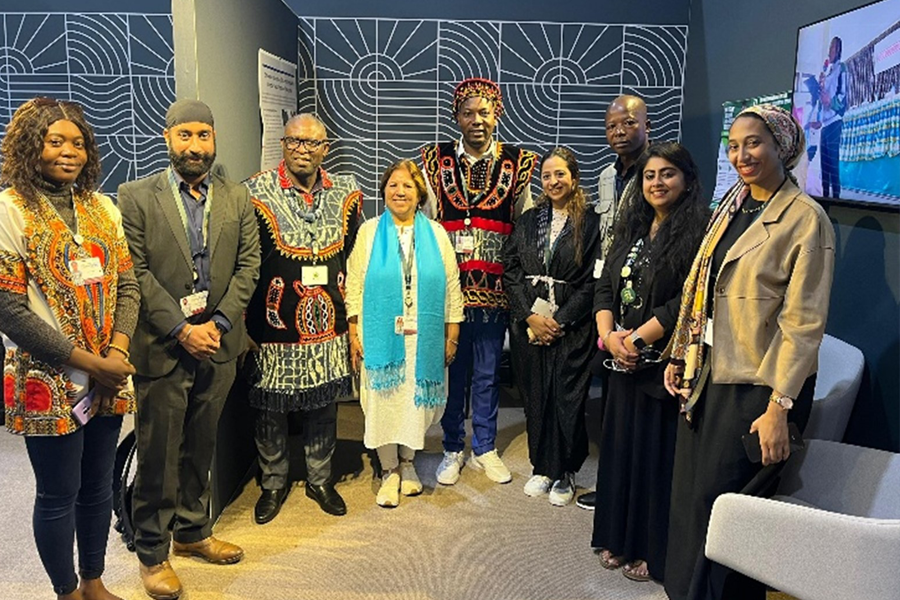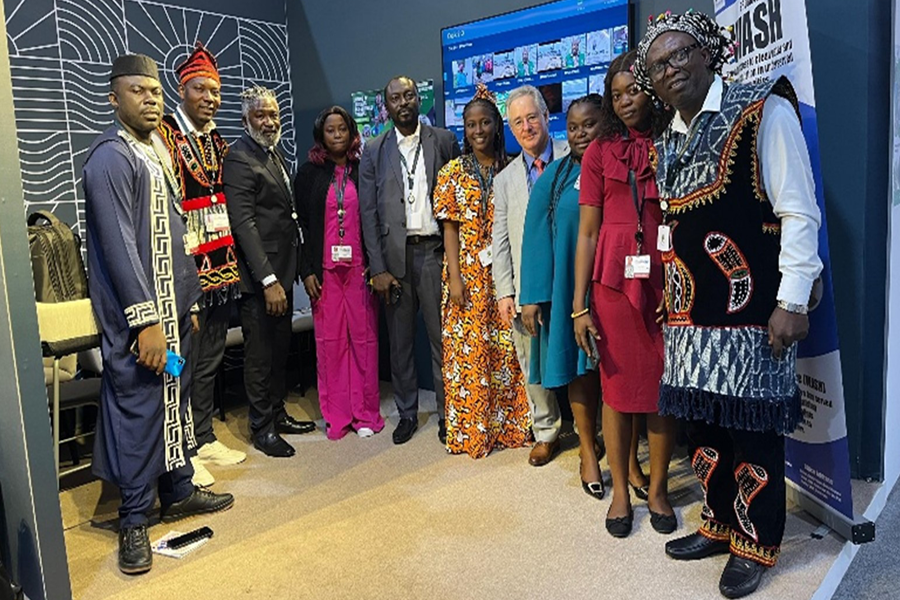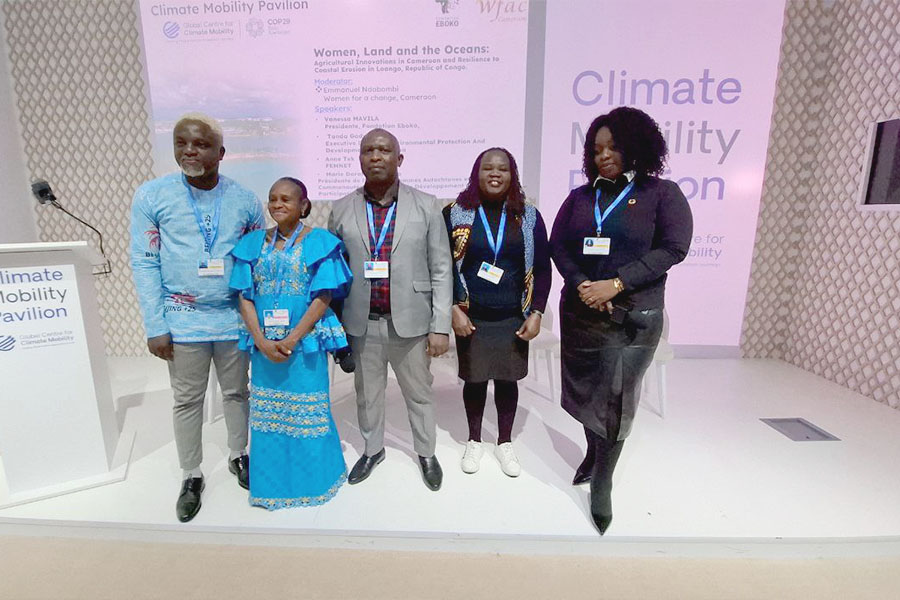The Environmental Protection and Development Association (EPDA) is calling on qualified contractors, NGOs, and service providers to submit Expressions of Interest (EOIs) for the construction of toilets and rehabilitation of waterpoints in key communities across the South West Region. This initiative targets improved hygiene, sanitation, and access to clean water in the following localities: Tombel and Bangem (Kupe-Manenguba Division), and Tiko, Limbe I, II & III, and Moyuka (Fako Division). EPDA seeks to collaborate with competent actors committed to sustainable development, health, and environmental protection. Interested parties are encouraged to download the full EOI document to review the technical specifications, eligibility criteria, and application guidelines. Download a more detaild call via the link provided
Call for Expressions of Interest: Water Infrastructure Rehabilitation in Mamfe and Eyumodjock
Environmental Protection and Development Association (EPDA) is inviting qualified and experienced contractors and local service providers to express their interest in the rehabilitation and extension of water points, restoration of catchments, and minor repairs of head taps in targeted areas. This initiative aims to improve access to clean water and strengthen community resilience in Mamfe Centre (Egbekaw) and Eyumodjock, key locations in urgent need of water infrastructure improvements. Interested stakeholders are encouraged to participate in this opportunity to contribute to sustainable development in the region. Download the full Call for Expressions of Interest (EOI) document below for detailed technical requirements, eligibility criteria, and submission procedures. Download a detailed PDF Version
EPDA Cameroon Announces Call for Tender: Borehole Construction and Water Extension Works
Posted: April 16, 2025 The Environmental Protection and Development Association (EPDA) is pleased to announce a call for tender for the construction of solar boreholes in communities across the Southwest region of Cameroon. Project Overview This initiative is part of our joint EPDA-UNICEF-ECHO project “Addressing the Multi-faceted Humanitarian Needs in Education for Children Affected by the Crisis in the Northwest and Southwest Regions of Cameroon.” The project aims to improve access to clean water for educational facilities and surrounding communities affected by the ongoing crisis. Tender Details Reference Number: EPDA/CFT/2025 Issue Date: April 16, 2025 Closing Date: April 25, 2025 Scope of Work The successful contractor will be responsible for comprehensive borehole installation services including: Hydrogeological surveys to identify optimal drilling locations Drilling boreholes (60-100 meters depth) Installation of complete solar-powered pumping systems Construction of water storage facilities Installation of distribution systems with multiple access points Testing and commissioning Training local management committees on maintenance and operations Eligibility and Submission We invite qualified contractors with experience in solar borehole construction to submit their bids. Interested parties should download the complete tender documentation package below for detailed specifications, eligibility requirements, and submission guidelines. Tender Documents Contact Information For inquiries related to this tender, please contact our procurement department at info@epdacameroon.org or call +237 677227766 during office hours. EPDA is committed to transparent procurement processes and equal opportunity for all qualified bidders. We encourage local contractors to participate in this tender process.
Breaking the Treadmill: Bridging Forestry, Agriculture, and the Rio Conventions for a Sustainable Future
Event Overview This thought-provoking panel discussion convened experts, youth leaders, and environmental advocates to explore the critical interconnections between forestry, agriculture, and global environmental frameworks, including the three Rio Conventions. The session highlighted the biodiversity conservation efforts on the Mongolian Plateau, as well as the potential of agroecology to restore soil health and combat land degradation. Participants collaborated to identify actionable pathways for bridging sectoral and generational gaps to achieve a sustainable future. Host: EPDA Cameroon Panelists: Moderator: Hemanshu Prof. Suo Cheng Dong (Academician, China) Neekita Urang (Climate Advocate, India) Ajuna Tadeo (Youth Leader, Uganda) Discussion Highlights Desertification: Combating and Green Development Practices in Northwest China and the Mongolian Plateau: Prof. Suo Cheng Dong shared innovative strategies and practices that blend scientific insights with traditional ecological knowledge to combat desertification and foster sustainable development. Bridging Forestry and Agriculture gap: Neekita Urang emphasized the need for integrated policies that align agricultural productivity with forest conservation, addressing trade-offs and creating synergies between the two sectors. Youth and Community as Catalysts for Change: Neekita Urang and Ajuna Tadeo discussed how youth-led initiatives and local community engagement are critical for driving sustainable practices and innovative solutions. Intergenerational Collaboration: A lively and participatory intergenerational discourse explored the role of experienced leaders in mentoring young activists, fostering knowledge exchange, and ensuring continuity in sustainable land management efforts. Objectives Achieved Synergy Identification: Emphasized the critical need to align forestry, agriculture, and environmental policies for sustainable, integrated solutions. Enhancing Cooperation: Highlighted the value of inter-sectoral collaboration and innovative financing to address sustainability challenges. Youth Empowerment: Amplified youth voices, showcasing their initiatives as key drivers of change while emphasizing the need for platforms that foster capacity building and resource mobilization. Key Takeaways Integrated Strategies: Sustainable land management requires holistic approaches that address climate, biodiversity, and land restoration objectives collectively. Inclusive Stakeholder Engagement: Engaging diverse stakeholders, particularly youth and local communities, ensures long-term effectiveness and ownership of sustainable practices. Technology and Financing: Leveraging technology and innovative financing mechanisms can scale integrated solutions to address environmental challenges effectively. Conclusion The session concluded with a reflective question from the moderator: “How can generations collaborate to deliver sustainable solutions for land, climate, and biodiversity?” This interactive discussion bridged generational knowledge gaps, fostering a dialogue that blended traditional wisdom with contemporary innovation, paving the way for sustainable environmental stewardship. Acknowledgments EPDA thanks the organizers, panelists, and participants for their invaluable contributions to this critical discussion. The outcomes of this event will inspire future actions and collaborations toward a more sustainable and inclusive future.
Panel Discussion Report: Water Sustainability and Land Management: A Reflection from Africa and Developing Countries.
Venue: EPDA (B13) Pavilion UNCCD COP16 RIYADH Moderator: Tanda Godwin (EPDA) Panelists Sunday Geoffrey (SUHUCAM) Riham Helmy (Envirox) Harrison Nnoko (AJESH) Dr. Meena Bilgi (Green Future Foundation) Francis (PCA ASMDE Relief) Mr. Tanda Godwin (moderator) Key Discussion Themes The panel started with a background note to water sustainability and land management practices across the world water stressed areas and desert lands as follows: Water sustainability and land management are critical global challenges, particularly in desert and semi-arid regions where water scarcity and land degradation threaten ecosystems, livelihoods, and human well-being. These issues are central to the United Nations Convention to Combat Desertification (UNCCD), which addresses land degradation neutrality (LDN) and promotes sustainable land and water use practices. The UNCCD cop 16 brings renewed attention to these challenges, fostering discussions and commitments to enhance resilience in the world’s most stressed ecosystems. Within the context of Global Context of Water Scarcity and Land Degradation: Approximately 40% of the world’s land is classified as drylands, hosting over 2 billion people, many of whom depend on fragile ecosystems for agriculture and livelihoods. Desertification impacts 23% of global land, reducing productivity, threatening food security, and increasing vulnerability to climate change. Over 2 billion people live in regions experiencing high water stress. Global warming exacerbates water scarcity, especially in desert regions like the Sahel, Middle East, North Africa, and parts of Asia and Australia. Rising temperatures and erratic precipitation patterns worsen soil erosion, water shortages, and desertification, disproportionately affecting marginalized communities. The panel discussions were then focused on responding to the practices of irrigation and land management practices and the challenges and local solutions related to irrigation and land degradation in India, Cameroon, Egypt and Dr Congo, with each panelist sharing insights and perspectives from their respective organizations and countries. Panelist Perspectives Country perspectives Irrigation challenges in different African and developing countries Land degradation issues Potential mitigation strategies Regional water sustainability approaches Recommendations from Panelists Focus on the context and cultural practices and leveraging on indigenous knowledge that trigger sustainable management. Women and children should be at the center of thinking actionable initiatives as they are the most vulnerable yet the women are the teachers and the children are the future More efforts should be put to carry out indebt scientific research on specific regional irrigation potentials and cultural practices which then inform policies, opens up for financial resource mobilization and integration of technology for which youth will be at the forefront. Explore collaborative approaches to land management Develop targeted strategies for water conservation Stablish the green school initiative across academia and in communities for a better youth fulfilled future. Acknowledgments EPDA extends its gratitude to the organizers, panelists, and participants for their invaluable contributions to this critical discussion. The outcomes of this event will inspire future actions and collaborations towards a more sustainable and inclusive future.
EPDA Panel Discussion on Agro-Food Systems at UNCCD COP16 – December 5, 2024
On December 5, 2024, the Environmental Protection and Development Association (EPDA) hosted a compelling panel discussion on the theme “Agro-Food Systems” as part of the UNCCD COP16 conference. Moderated by EPDA’s Executive Director, Mr. Tanda Godwin, the event convened experts, advocates, and stakeholders to explore pressing issues related to sustainable agriculture and food security. To set the stage, Mr. Godwin provided an insightful overview of agroecological practices, highlighting case studies from across Africa. This contextual introduction framed the discussion and posed key questions for the panel: How can policies drive the adoption and scaling of agroecological practices? What role does civil society play in promoting agroecology and supporting farmers? How are local communities implementing agroecological solutions, and what challenges do they encounter? How can businesses and entrepreneurs invest in sustainable agriculture and strengthen value chains for agroecological products? The first panel, titled “Promoting Agroecological Practices to Restore Degraded Lands and Improve Food Security,” featured Mr. Sunday Godfrey, Executive Director of SUHUCAM, who shared practical insights on agroecological innovations and their role in combating land degradation while enhancing food production. The second panel, “Empowering Women and Youth as Key Agents in Sustainable Land Management and Improved Food Production,” spotlighted Sarah, EPDA’s Youth Coordinator, who emphasized the importance of youth and women’s active participation in advancing sustainable agricultural practices and land stewardship. During the general discussions, Mr. Peter Ngole, Executive Director of AJESH, explored the policy dimensions of agroecology in Cameroon, highlighting technology integration and networking as crucial enablers for scaling incomes and fostering land restoration initiatives. Mr. Wajiri Melvine, President and Founder of PEP Africa, stressed the social development aspect of agroecology, emphasizing that food security is a universal right. He called for collective action among governments, civil society organizations, and the private sector to prioritize agroecology as a central strategy for sustainable development. Additionally, Michael A. Cullen, (D.Phil.) who is the Managing Director, Head of Africa Project Sourcing at Terra Global Capital Ltd and an AJESH Partner, provided a global private sector perspective on agroecology, underscoring the role of forest restoration and carbon sequestration in combating climate change and advancing sustainable land management. It should be noted that Terra Global Capital Support the development of market mechanisms structured to conserve and sustain ecosystem services. Held at the EPDA Pavilion (B13), this session offered a dynamic platform for exploring diverse aspects of agro-food systems, including land restoration, sustainable farming, and socio-economic empowerment. The insights and recommendations shared by the distinguished panelists contributed meaningfully to the broader discussions at UNCCD COP16, underscoring agroecology’s vital role in achieving land degradation neutrality and food security globally. Back to UNCCD COP16 Main page
EPDA Participation at UNCCD COP16 – December 3, 2024
EPDA showcased its commitment to global environmental solutions by participating in a key panel discussion at the Commonwealth Pavilion. The session, titled “Sustainable Land Management and Climate Resilience: Tackling Drought and Land Degradation,” provided a platform for EPDA to present insights and collaborative strategies addressing pressing environmental issues. The discussion emphasized the synergy between land management, climate adaptation, and resilience-building, aligning seamlessly with EPDA’s mission to drive sustainable environmental stewardship. Back to UNCCD COP16 Main page
EPDA Participation at UNCCD COP16 – December 2, 2024
The Environmental Protection and Development Association (EPDA) marked the commencement of its participation at COP16 by setting up its pavilion. This initial effort focused on strategic preparation, including the placement of roll-up banners, posters, and other visual materials to effectively highlight EPDA’s mission and ongoing initiatives. The pavilion attracted significant attention, with diverse stakeholders and conference attendees engaging with EPDA representatives to explore their contributions to land restoration and sustainable resource management. Back to UNCCD COP16 Main page
EPDA Pavilion Launch at UNCCD COP16 – December 4, 2024
On Wednesday, December 4, EPDA officially launched its pavilion at the UNCCD COP16 in Riyadh, hosting an opening ceremony and round table discussion under the theme: “Defining and Pioneering Pathways to Climate and Drought Resilience for a Sustainable Land Restoration Future.” The event brought together delegates from organizations across Africa and beyond, reflecting a diverse array of stakeholders committed to addressing land degradation and climate resilience. In his welcome address, Mr. Tanda Godwin, Executive Director of EPDA, emphasized the organization’s strategic focus on championing initiatives aligned with UNCCD themes. He outlined EPDA’s objectives and vision for pioneering sustainable solutions to land restoration, climate resilience, and drought adaptation. Following the keynote, participants engaged in insightful deliberations on innovative pathways to achieve sustainable land restoration, marking the commencement of EPDA’s program at Pavilion B13. These sessions and side events are designed to facilitate the exchange of best practices, showcase successful interventions, and foster networking opportunities for collaborative action. The EPDA Pavilion featured dynamic visual displays, including posters, roll-up banners, and exhibition materials highlighting EPDA’s key initiatives and partnerships aimed at promoting environmental sustainability and community resilience. Back to UNCCD COP16 Main page
EPDA Pavilion Program Overview
Day 1: December 2, 2024 – Pavilion Setup Morning & Afternoon: Pavilion setup and logistical arrangements to ensure a functional and welcoming space for delegates and visitors. Day 2: December 3, 2024 – Opening & Strategic Dialogues Theme: Defining Pathways to Climate and Drought Resilience for Sustainable Land Restoration Morning: Opening Ceremony & Round Table Discussion “Pioneering Pathways to Climate and Drought Resilience for a Sustainable Land Restoration Future” Day 3: December 4, 2024 – Land Restoration Theme: Community-Led Approaches to Land Restoration Morning: Panel Discussion: “Community-Led Approaches to Land Restoration: Best Practices and Success Stories” Afternoon: Round Table Discussion: “Scaling Up Community-Based Restoration Models” Day 4: December 5, 2024 – Agro-Food Systems Theme: Agroecology and Sustainable Practices Morning: Panel Discussion (EPDA & SUHUCAM): “Agroecology and Sustainable Practices for Land Restoration and Food Security” Afternoon: Round Table Discussion: “Empowering Women and Youth as Key Agents in Sustainable Land Management and Food Production” Day 5: December 6, 2024 – Governance Theme: Inclusive Land Governance Morning: Panel Discussion (AJESH): “Sustainable Land Governance: Engaging Indigenous Peoples and Local Communities” Afternoon: Session (EPDA & Envirox): “Irrigation Practices and Water Security: Approaches to Sustainable Farming and Regenerative Agriculture” Day 6: December 7, 2024 – EPDA Exhibition Day Theme: Interactive Community Engagement Morning & Afternoon: Interactive Games and Activities: “Water for Life” Game “Climate Quest” Game “Desertification Escape Room” Panel Discussion (SUHUCAM): “Sustainable Land Restoration through Community Participation: Success Stories from Indigenous Land Rights and Community Stewardship” Day 8: December 9, 2024 – Resilience Theme: Building Resilience Through Land Restoration Morning: Panel Discussion (EPDA & Envirox): “Land Restoration as a Strategy for Climate Change Mitigation and Adaptation” Afternoon: Workshop: “Boosting Community Resilience through Practical Approaches to Improve Quality of Life and Well-Being” Day 9: December 10, 2024 – Technology and Innovation Theme: Harnessing Technology for Sustainable Land Management Morning: Round Table Discussion: “Unlocking Funding for Small-Scale NGOs in Restoration Projects” Afternoon: Session: “Using Technology to Combat Deforestation and Land Degradation: A Community-Driven Approach” Day 10: December 11, 2024 – Finance for Resilience Theme: Advancing Financing Solutions for Land Restoration Morning: Panel Discussion: “Advancing Regenerative Agriculture for Resilient Food Systems and Green Economic Growth” Afternoon: Panel Discussion: “Paving the Path to Land Degradation Neutrality through Landscape Management Approaches” Day 11: December 12, 2024 – Strategic Planning Theme: Planning for the Future of Land Restoration Morning & Afternoon: Strategic Planning Meetings Development of EPDA’s Strategic Roadmap for Scaling Land Restoration and Community Empowerment Initiatives Intended Outcomes of EPDA’s Participation Strengthened Partnerships: Establish new collaborations with national and international stakeholders to support EPDA’s mission and expand its impact. Increased Visibility: Enhance EPDA’s visibility as a leading organization in community-based land restoration in Cameroon and the Sahel region. Resource Mobilization: Secure commitments for funding and technical support for EPDA’s ongoing and future restoration projects. Knowledge Sharing: Disseminate best practices, tools, and methodologies for sustainable land management and climate resilience. Policy Advocacy: Influence policy discussions at COP16 by showcasing community-led solutions and advocating for inclusive and participatory approaches to land governance. Conclusion EPDA’s participation at UNCCD COP16 will demonstrate its commitment to combating desertification, restoring degraded lands, and empowering local communities. By fostering dialogue, collaboration, and action, EPDA aims to contribute to global efforts toward achieving Land Degradation Neutrality (LDN) and building a sustainable and resilient future for all. Back to Back to UNCCD COP16 Main page

